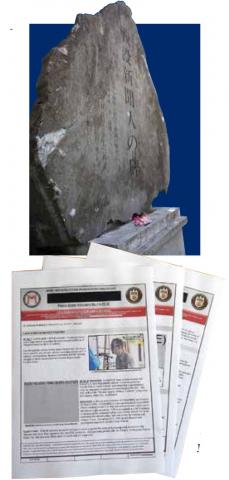Issue:

The battle for press freedom on Okinawa
Far from the Tokyo media, journalists on Okinawa must struggle with authorities and the U.S. military to get their stories told.
by JON MITCHELL
In a park near the seashore in Naha City stands the Memorial to Fallen Journalists, a stone slab carved with the names of the 14 Japanese reporters 10 of whom worked for the island’s former Okinawa Shimpo who died during the Battle of Okinawa. Among the copy the reporters filed before dying were articles with headlines such as “Grenade charge on enemy camp” and “Advance on Shuri thwarted by heavy resistance,” stories which glorified the combat and misled readers into believing the Japanese military was winning the war.
Missing from their reports was the reality of what was actually happening on the ground: the slaughter of Okinawan children drafted into the Imperial army; Japanese troops forcing civilians from their shelters instead of protecting them; the execution of Okinawans suspected as spies for speaking their own language.
By the end of the three month battle, more than a quarter of the civilian population was dead and the cultural heritage of the former Ryukyu Kingdom was all but obliterated. As a result of this collective trauma and the role of their peers in romanticizing the militarism that destroyed their island, subsequent generations of Okinawan reporters developed a strong pacifist streak.
During the 70th anniversary of the Battle of Okinawa last spring, this spirit was clearly on display when members of the media gathered at the Memorial to Fallen Journalists, united by the vow that never again would they wield their pens or cameras in support of war.
Not only is this conviction rooted in the experiences of 1945, it has been reinforced in the following decades as Okinawan reporters bore witness to a litany of human rights abuses by the U.S. military on their island: the displacement of 250,000 residents to build bases; rapes and murders; hit and runs, aircraft crashes and environmental degradation. Then there has been the political oppression, as first Washington and then Tokyo attempted to oust local leaders who dared to speak out against these violations, like Naha Mayor Kamejiro Senaga, exGovernor Masahide Ota and the current Governor Takeshi Onaga.
I HAVE BEEN REPORTING on Okinawa for seven years. But during this very short period, I’ve uncovered U.S. military malfeasance ranging from revelations the Pentagon was on the brink of nuking then non aligned China during the Cuban Missile Crisis and the Cold War storage of tens of thousands of barrels of Agent Orange on the island to, more recently, alliances between the U.S. Marines and Japanese neo nationalist groups and the military orientation lectures which teach new arrivals that Okinawans have “double standards” and their complaints are “self serving.”
It is the responsibility of the Japanese government to hold Washington to account for such injustices. Instead, it allows the U.S. to act as though they still own the island as they did between 1945 and 1972.
Fortunately, like the shiisa deities guarding the rooftops of many Okinawan homes, the island’s media are keenly aware of their role of protecting the public’s right to know. They act as vocal critics of U.S. military misdeeds and Tokyo’s refusal to spread the military presence more evenly throughout Japan. However this work has brought Okinawa’s media and meunder fire from a variety of quarters.
LDP members have a history of lashing out against Okinawa’s newspapers. In 2000, Yoshiro Mori, then Secretary General of the LDP and current Olympic czar, accused the local dailies of opposing the nation and being dominated by the Japan Communist Party. In 2006, present Tokyo Governor Yuriko Koike, in her role as Minister of State for Okinawa and Northern Territories Affairs, labeled the Okinawa media “anti U.S.” Most famously, last year, Naoki Hyakuta, the former board member of NHK, called for the destruction of the two papers.
SUCH ATTITUDES HAVE TRICKLED down to impact the daily work of Okinawan journalists. In August, Japanese riot police physically prevented two reporters from covering demonstrations against the construction of U.S. Osprey pads in the northern Yanbaru jungles. In October, PM Abe’s Cabinet ruled the police action “appropriate” setting a very dangerous precedent for future interference in journalists’ work.
I first experienced a backlash against my own reporting in 2013, when the Pentagon released a nine month investigation to discredit my research into the storage of Agent Orange on Okinawa. More recently, in the August edition of the Japanese right wing magazine Okinawa Times , dedicated to the theme of exposing the “Enemies of Japan,” an eight page article focused on my work; the author lamented how the Japanese government had failed to censure me for my reporting.
But these petty harassments pale in comparison to what was revealed in U.S. military police documents that I received this autumn via the Freedom of Information Act. One of the reports, dated June 9, contained my photo, profile and notes about a lecture I’d given near Camp Schwab, Nago City. Further more, in a move apparently designed to prevent my ability to file online FOIA requests, my home IP address has been blocked from accessing USAF websites.
To find out who’d ordered the block, I filed a conventional FOIA request and, following a 10 week tussle, finally received a stack of internal emails exchanged between senior military officers. Although it seems the USAF had withheld the documents related to the period the block was first enacted, what the papers did contain were accusations that I was “hostile,” “adversarial” and “non-cooperative.”
Everyone is entitled to his or her opinion and I’m sure my editors have called me far worse in their own emails so I take these officials’ comments as a sign I am doing my job well. However, the surveillance and block age of my IP address are designed to obstruct my work as an investigative journalist and are clear violations of press freedoms.
THE FREEDOM OF THE Press Foundation, whose board includes Daniel Ellsberg and Edward Snowden, condemned the military’s actions against me. “Whether inside or outside the United States, the U.S. military should not be surveilling journalists and writing up intelligence reports on their lawful activities, full stop,” said Executive Director Trevor Timm. “By doing so they are imperiling journalists in their home countries and sending a dangerous message about press freedom abroad.”
On Oct, 23, Reporters Without Borders issued a statement that slammed the U.S. military and the Japanese authorities for their pressure on the Okinawa media. The statement topped the front pages of the Okinawa Times and Ryukyu Shimpo and made the national NHK morning news. Sankei Shimbun, whose own former Seoul Bureau Chief was supported by RWB after being indicted in South Korea for defaming the president, also reported the statement albeit with an emphasis on Chief Cabinet Secretary Yoshihide Suga’s denials that the government suppressed Okinawa press freedoms.
The rest of the national media and the Japan based international media chose not to report the statement. This is nothing new. For all too many Tokyo cocooned journalists, what happens on Okinawa stays on Okinawa.
Nowhere is this gap more obvious than in recent coverage of the contamination at Tokyo’s Toyosu fish market visavis the contamination on Kadena Air Base, central Okinawa. While the discovery of arsenic and chromium at Toyosu dominated nightly news shows and newspaper columns for days, little to no coverage was afforded to discoveries in January that Kadena had polluted the drinking water sources for seven municipalities including Naha with high levels of the contaminant, perfluorooctane sulfonate.

Opposite, Japanese riot police guard USMC Osprey construction sites in northern Okinawa. Top, the Memorial to Fallen Journalists in Asahigaoka Park in Naha City. Above, USMC Criminal Intelligence Division documents reveal surveillance of Okinawans and journalists.
Neglect of Okinawan issues by the mainland Japanese media allows misinformation to fill the void. Alongside a host of anonymous bloggers and Twitter users spreading deceit is the publishing arm of the Happy Science cult, whose founder is well known for interviewing such eminent spirits as Jesus Christ, Socrates and George Washington. A book published last year included an equally shocking scoop, as he channeled the spirit of Okinawan Governor Takeshi Onaga (still living,of course), confirming what many rightists had suspected all along that the governor has close ties to the Chinese Communist Party and is intent on bringing the island under the protection of the People’s Army.
the Chinese Communist Party and is intent on bringing the island under the protection of the People’s Army. claims that more than 75 percent of its bases were located on Okinawa a figure calculated by land area a “common misperception.” Instead, it said, the true number was 39 percent because only 33 of the total of 85 American bases located in Japan were there. Many, including Onaga, who called it a manipulation of the truth, met the statement with derision.
THE AMATEURISM OF THE military’s attempt to shape public opinion was surprising. Given the Pentagon’s average annual PR budget of more than $600 million, it ought to have come up with some thing a little slicker. Just look at its collaboration on Hollywood blockbusters such as Hurt Locker and Zero Dark Thirty (where the CIA even served as script doctors).
Switch on FOX News or CNN and the lines between news and Pentagon PR blur, too. For journalists and their bosses, military related stories are very attractive. Flybys and bang bang make great TV and offer a shortcut to the awards ceremonies. As news companies slash budgets and the U.S. government offers subsidized, but restricted, access to the military, the lure of glorifying the military will continue to be irresistible, creating the danger that journalists may become much more reluctant to report on the next My Lai, Haditha or Abu Ghraib.
With PM Abe racing to send Japanese troops to fight over seas for the first time in more than 70 years, the question of whether we will have enough courage to refuse to pick up our pens and iPads in support of those conflicts will be one we’ll need to ask ourselves very soon. The answer will shape the future of Japan for decades to come.
Jon Mitchell is a correspondent for Okinawa Times and regular contributor to the Japan Times. Last year, he was awarded the FCCJ's Freedom of the Press lifetime achievement award for his coverage of Okinawan human rights issues.

